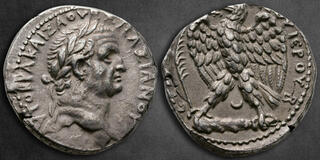| Savoca Numismatik GmbH & Co. KG > Online Auction 198 | Silver | Auction date: 25 February 2024 |
| Lot number: 187 Price realized: 400 EUR (Approx. 432 USD) Note: Prices do not include buyer's fees. | Show similar lots on CoinArchives Find similar lots in upcoming auctions on |
| Lot description: Seleucis and Pieria. Antioch. Vespasian AD 69-79. Dated "New Holy Year" 2 (AD 69/70). Tetradrachm AR 26 mm, 15,24 g AYTO KPA KAICA OYЄCΠACIANOY, laureate head right / ETOYC NЄOY IЄPOY B (date), Eagle standing left on club, with wings displayed, holding wreath in beak; palm branch to left, crescent between legs. Near Extremely Fine McAlee 351; RPC II 1961; Prieur 127. In the year 70 AD, under the watchful gaze of newly minted Roman coins bearing his image, Emperor Vespasian embarked on a mission to mend a fractured empire. The world he inherited was one scarred by the ambitions of fallen emperors, its lands soaked with the blood of civil discord. Yet, in this year, deemed sacred by the fates that whispered of renewal, Vespasian sought not just to rule but to heal and rebuild. The streets of Rome, still echoing with the ghosts of recent tumult, found in Vespasian a ruler unadorned by the extravagance of his predecessors. He was a man of the earth, his hands not unfamiliar with the toil of life, his ascent to power a tale as extraordinary as the omens that foretold it. Legends spoke of flaming swords hanging over Jerusalem and a cow giving birth to a lamb, signs that the heavens themselves had anointed a new era under Vespasian. His reign's second year saw efforts that could only be described as Herculean. Vespasian's gaze turned outward to the edges of his empire, where the smoldering embers of rebellion lay. In the distant lands of Judea, his son Titus laid siege to Jerusalem, a city that held out against the might of Rome. The fall of Jerusalem was not just a military victory but a statement of the indomitable will of the Flavian dynasty, a message inscribed in the ashes of the temple that Rome's reach was both absolute and divine. Yet, it was not by sword alone that Vespasian sought to carve his legacy but through the stones of Rome itself. Amidst the clamor of a city reborn, the foundations of the Flavian Amphitheatre rose, a monument to both Rome's splendor and its scars. Funded by the spoils of war, it was a promise of entertainment and escape for the common man, a grand gesture that bread and circuses could salve the wounds of past conflicts. And in the quieter chambers of his palace, Vespasian pondered the empire's coffers, drained by years of strife. With a pragmatism that became the hallmark of his rule, he introduced taxes that drew both ire and amusement. The urine tax, levied on the collection of what was then a valuable commodity, became a symbol of his unorthodox methods to restore Rome's fortunes. It was said that when his son Titus questioned the dignity of such a tax, Vespasian held a coin to his nose and declared that money did not stink-a lesson in the realities of power and prosperity. Vespasian's reign, though marked by the pragmatism of its policies, was also a testament to the resilience of the human spirit. In a year deemed holy, he wove together the disparate threads of a beleaguered empire, binding them with the promise of peace and stability. His was a story of redemption, not just for himself but for Rome, a narrative that spoke of the possibility of renewal in the aftermath of chaos. Thus, in the annals of history, the second year of Vespasian's rule stands not merely as a sequence of events but as a chapter in a grander tale of revival. It was a year when Rome, battered by its own ambitions, found in a single man the strength to dream of greatness once more Starting price: 400 EUR |  |


